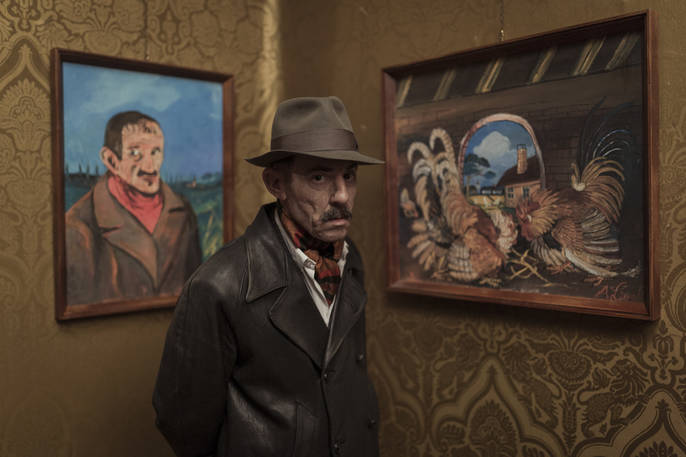


Anyone over a certain age will remember their initial contact with Antonio Leccabue, known as Ligabue [2], through the 1977 TV show starring Flavio Bucci [3]. An immense, larger than life Bucci. Had it been a movie, it would’ve won an Oscar.
A prize for which - I’ll say it now, a full year before the next award season - I believe Elio Germano [4] too will be nominated. As will the film, which will win every award possible in Italy. We’ll see how it does in Berlin.
Crippled, distorted, outcast, homeless, suffering from gout, rachitism, goiter, mental problems, abandoned by his mother in Switzerland, poor. This is Antonio Ligabue, an authentic genius, whose body went through every possible humiliation, from which he always re-emerged in bursts of colors and brushtrokes, à la Van Gogh. A pure and noble soul, a good, humble man; no wonder he loved children and animals, who so resembled him.
He finds refuge along the shores of the Po river. Emilia will both welcome and reject him, he will always be “el tudesc.” (the German) The one people avoid when he walks down the street, the mad tudesc. Reserved, very quiet, he just wanted to be loved. He wanted a wife, he wanted just one kiss. He's part of a community who welcomes him but also makes fun of him, where the role of the fool is seen as necessary, like that of the doctor or the lawyer.
“The remorse of his spirit, who created so much through solitude and pain, remains in those who understood how up until his final day all he wanted was freedom and love,” reads the epitaph on his tomb in Gualtieri.
The ones who truly understood him were the two artists Mazzacurati and Mozzali, who gave him love, shelter, warm meals, and real artistic opportunities, canvases, colors; without them, there might never have been Ligabue. The one who truly understands him is Giorgio Diritti, who spent a long time studying the figure of Ligabue and speaking to those who knew him. The one who naturally understands him is Elio Germano, who once again reveals his shining talent.
Elio disappears inside Antonio's frail body, which he drags around, knotted, twisted, gangling, his perpetually open mouth ready to catch a drop of love.
It’s a movie about difference, about acceptance, about the ability to see the soul beyond matter. It is in part reminiscent of David Lynch’s Elephant Man - he too only wanted to sleep like the others. And, naturally, it also recalls the figure of Joker, who only wanted to make people laugh.
Even when Ligabue starts becoming somewhat successful, there is always a veil of fatalism to his unhappiness, only occasionally lifted by the sound of the motorcycles Antonio bought, the only way he had of feeling like everyone else.
But, though he doesn’t have many words, Ligabue certainly has drawings, soul, colors, he has an expressive anxiety devouring him from the inside, bringing him to act like his beloved animals, rolling around and flapping his arms as if he were flying.
Beyond Germano’s breath-taking performance, there is also Girogio Diritti’s poetic hand, incredibly skilled at investigating the territory of Padania, slowly moving through the canes on the shores of the Po, through the sounds of nature, recounting silences, analyzing its almost medieval faces, showing Toni’s sad yet never victimized eyes.
Source URL: http://iitaly.org/magazine/focus/art-culture/article/elio-germano-becomes-ligabue
Links
[1] http://iitaly.org/files/eliogermanochicodeluigi-799b9966jpg
[2] https://en.wikipedia.org/wiki/Antonio_Ligabue
[3] https://en.wikipedia.org/wiki/Flavio_Bucci
[4] https://en.wikipedia.org/wiki/Elio_Germano